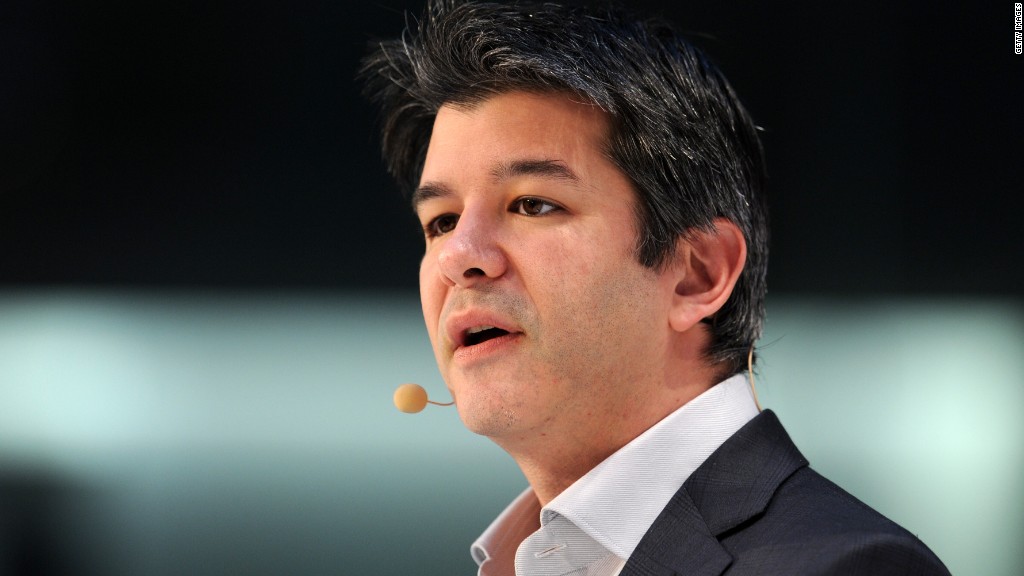
Uber's day of reckoning has arrived -- and with it perhaps a moment of truth for all technology startups.
Uber unveiled sweeping recommendations on Tuesday following a months-long investigation into its corporate culture. At the same time, CEO Travis Kalanick stepped aside indefinitely to grieve for his mother and to work on improving leadership at Uber.
The announcements capped off nearly six bruising months of scandals and PR crises. The constant drumbeat of damaging stories has transformed Uber from a poster child of the industry into a cautionary tale for startups trying to grow at all costs while refusing to grow up.
Some of Uber's flaws, highlighted in Tuesday's recommendations, are all too common among companies in Silicon Valley: a founder with too much unchecked control, not enough diversity on staff and charges of sexism. The last of those became painfully apparent when an Uber board member resigned Tuesday night after making a sexist joke at a company meeting about sexism.
But other Uber pitfalls highlight the unique risks facing a new generation of startups.
In recent years, a growing number of tech companies have raised unprecedented sums of private capital at lofty valuations. Many, including Uber, have used that money to put off going public as long as possible.
While this shields startups from Wall Street scrutiny, it comes with a downside. Going public forces companies to impose more "discipline and grown up behavior," according to Lise Buyer, an IPO expert with Class V Group who helped take Google (GOOGL) public.
"Often, but not always, that 'straighten up and fly right' ethos pervades all elements of the business and culture as successful companies morph from Wild West startups into thriving enterprises," Buyer tells CNN Tech.
Related: Uber CEO takes leave of absence amid crises
With no IPO in sight, Uber was able to put off certain basic leadership hires as well as financial and human resources discipline you would expect to find with a public company of comparable size.
Uber didn't hire its first actual head of HR until 2014, shortly before it was valued at $18 billion. Last year, Uber lost a staggering $2.8 billion and yet it doesn't have a CFO. In fact, as the crises continue to unfold, Uber is operating without a COO, CMO, president and, at least temporarily, a CEO.
The company is now actively trying to fill some of these positions as well as adding members to its board. Much of that might have happened already if Uber had been serious about going public sooner.
"The problem," says Buyer, "is the bigger the company and the longer it has operated with a free rein, the exponentially more difficult it is to change those habits and culture."
At Uber, the culture was aggressive and confrontational. Principles like Always Be Hustlin' and Toe Stepping were featured on a list of the company's 14 "cultural values."
Those values weren't an accident. Uber, like a number of its startup peers, set out to upend lucrative regulated markets. It chose to skirt what it saw as outdated rules and played by its own.
It has been accused of building a tool to help drivers dodge regulators and faces a court battle over allegations that an exec stole self-driving car technology from Google's Waymo. Uber's CEO has even admitted to undermining its chief rival's fundraising efforts.
Uber is "a warning that taking the concept of 'flouting the rules' to its logical extreme won't yield great consequences forever," says Ethan Kurzweil, a partner at Bessemer Venture Partners. "No company gets the right to smash the normal bounds of acceptable human behavior indefinitely."
Uber isn't the first to receive a comeuppance for this behavior. Zenefits, an HR software startup once valued at $4.5 billion, was rocked by charges of its insurance agents acting without proper licensing and inappropriate office behavior.
But Uber isn't just another startup. It is the king of the unicorns. It was revered for having the highest private valuation of any startup and a seemingly limitless ambition to remake the transportation industry.
Countless startups grabbed on to its coattails and pitched themselves as the "Uber, but for X." Now it may go down as Uber, but for what not to do.

